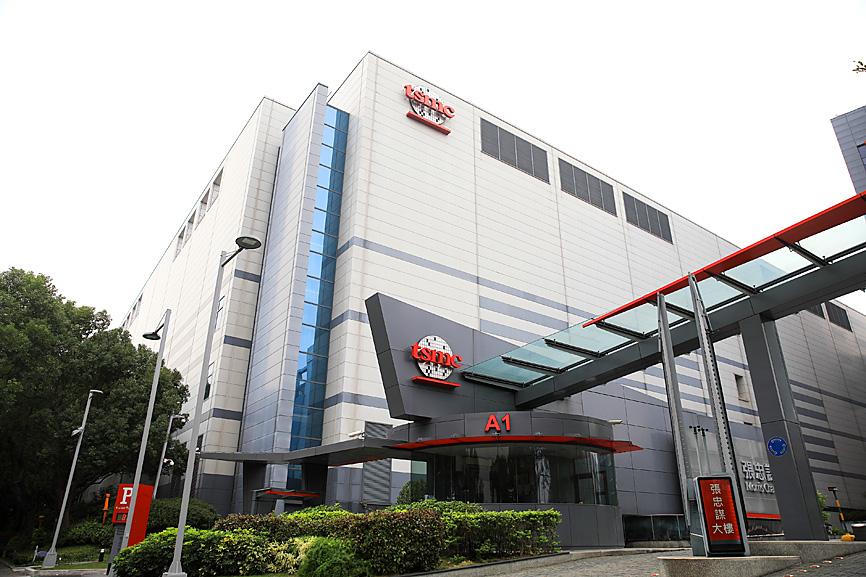Taiwan Semiconductor Manufacturing Co (TSMC, 台積電) yesterday said operations at all of its plants had returned to normal after an early morning magnitude 6.6 earthquake near Hualien caused sporadic evacuations and minor machine damage.
Technical hiccups triggered by the earthquake, which struck off the coast of Hualien County at 1:41am, had been rectified following an inspection, TSMC said.
The world’s largest contract chipmaker said that temporarily evacuated workers had all returned to production lines with the effect on operations expected to be minimal.

Photo: I-Hwa Cheng, Bloomberg
TSMC runs advanced wafer plants at the Hsinchu Science Park (新竹科學園區), the Central Taiwan Science Park (中部科學園區) and the Southern Taiwan Science Park (南部科學園區).
The earthquake reached “6 weak” on Taiwan’s seven-tier intensity scale, which gauges the actual effect of a quake, in Taitung County’s Changbin Township (長濱), hitting 5 in other parts of the county and in Hualien County.
United Microelectronics Corp (聯電), a smaller contract chipmaker with wafer plants in Hsinchu and Tainan, said that some of its production equipment had been affected by the earthquake, but that self-protection mechanisms had nullified the impact on its operations.
Fellow contract chipmaker Powerchip Semiconductor Manufacturing Corp (力積電), based primarily at Hsinchu Science Park, said the earthquake had caused a loss of only two to three hours of production.
Vanguard International Semiconductor Corp (世界先進) said it has been checking for possible effects of the earthquake at its wafer plants in Hsinchu.
Flat panel maker AU Optronics Corp (友達光電) said the quake had caused temporary suspension of some of its production, but operations had returned to normal.
Rival Innolux Corp (群創光電) also reported a temporary halt to production due to the triggering of anti-shake mechanisms.
However, the firm said the impact was expected to be minimal, with all employees safe and operations returning to normal.
Administrators at the three science parks said they had not received reports of damage from tenants, with only Southern Taiwan Science Park reporting that machines were affected, but no material impact was expected.

WEAKER ACTIVITY: The sharpest deterioration was seen in the electronics and optical components sector, with the production index falling 13.2 points to 44.5 Taiwan’s manufacturing sector last month contracted for a second consecutive month, with the purchasing managers’ index (PMI) slipping to 48, reflecting ongoing caution over trade uncertainties, the Chung-Hua Institution for Economic Research (CIER, 中華經濟研究院) said yesterday. The decline reflects growing caution among companies amid uncertainty surrounding US tariffs, semiconductor duties and automotive import levies, and it is also likely linked to fading front-loading activity, CIER president Lien Hsien-ming (連賢明) said. “Some clients have started shifting orders to Southeast Asian countries where tariff regimes are already clear,” Lien told a news conference. Firms across the supply chain are also lowering stock levels to mitigate

Six Taiwanese companies, including contract chipmaker Taiwan Semiconductor Manufacturing Co (TSMC, 台積電), made the 2025 Fortune Global 500 list of the world’s largest firms by revenue. In a report published by New York-based Fortune magazine on Tuesday, Hon Hai Precision Industry Co (鴻海精密), also known as Foxconn Technology Group (富士康科技集團), ranked highest among Taiwanese firms, placing 28th with revenue of US$213.69 billion. Up 60 spots from last year, TSMC rose to No. 126 with US$90.16 billion in revenue, followed by Quanta Computer Inc (廣達) at 348th, Pegatron Corp (和碩) at 461st, CPC Corp, Taiwan (台灣中油) at 494th and Wistron Corp (緯創) at

NEGOTIATIONS: Semiconductors play an outsized role in Taiwan’s industrial and economic development and are a major driver of the Taiwan-US trade imbalance With US President Donald Trump threatening to impose tariffs on semiconductors, Taiwan is expected to face a significant challenge, as information and communications technology (ICT) products account for more than 70 percent of its exports to the US, Chung-Hua Institution for Economic Research (CIER, 中華經濟研究院) president Lien Hsien-ming (連賢明) said on Friday. Compared with other countries, semiconductors play a disproportionately large role in Taiwan’s industrial and economic development, Lien said. As the sixth-largest contributor to the US trade deficit, Taiwan recorded a US$73.9 billion trade surplus with the US last year — up from US$47.8 billion in 2023 — driven by strong

ASE Technology Holding Co (ASE, 日月光投控), the world’s biggest chip assembly and testing service provider, yesterday said it would boost equipment capital expenditure by up to 16 percent for this year to cope with strong customer demand for artificial intelligence (AI) applications. Aside from AI, a growing demand for semiconductors used in the automotive and industrial sectors is to drive ASE’s capacity next year, the Kaohsiung-based company said. “We do see the disparity between AI and other general sectors, and that pretty much aligns the scenario in the first half of this year,” ASE chief operating officer Tien Wu (吳田玉) told an